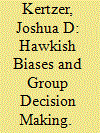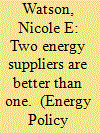| Srl | Item |
| 1 |
ID:
186591


|
|
|
|
|
| Summary/Abstract |
How do cognitive biases relevant to foreign policy decision making aggregate in groups? Many tendencies identified in the behavioral decision-making literature—such as reactive devaluation, the intentionality bias, and risk seeking in the domain of losses—have been linked to hawkishness in foreign policy choices, potentially increasing the risk of conflict, but how these “hawkish biases” operate in the small-group contexts in which foreign policy decisions are often made is unknown. We field three large-scale group experiments to test how these biases aggregate in groups. We find that groups are just as susceptible as individuals to these canonical biases, with neither hierarchical nor horizontal group decision-making structures significantly attenuating the magnitude of bias. Moreover, diverse groups perform similarly to more homogeneous ones, exhibiting similar degrees of bias and marginally increased risk of dissension. These results suggest that at least with these types of biases, the “aggregation problem” may be less problematic for psychological theories in international relations than some critics have argued. This has important implications for understanding foreign policy decision making, the role of group processes, and the behavioral revolution in international relations.
|
|
|
|
|
|
|
|
|
|
|
|
|
|
|
|
| 2 |
ID:
177136


|
|
|
|
|
| Summary/Abstract |
Usually consumers have a single energy supplier. Permitting consumers to take on additional contracts with local suppliers in a multiple-supplier model could support growth of local renewable energy. The aims of this study were to assess the attractiveness of a multiple-supplier model and to understand whether consumers would be more likely to engage with local energy suppliers in a multiple-supplier model or the current single supplier model. An additional aim was to explore the role of default effects and cognitive biases associated with remaining with incumbent suppliers (loss-aversion, cognitive effort and implied endorsement). Two nationally representative survey experiments were conducted in Great Britain (n = 1042, n = 762). Results showed that participants were significantly more likely to engage with local energy suppliers under a multiple-supplier model than the current single supplier model. In one experiment, consumers’ preference for adding a local supplier under a multiple-supplier model was so strong that it overcame default effects. The perception that the supplier has been recommended (i.e. implied endorsement) was the most robust mechanism associated with remaining with default suppliers, suggesting that explicit endorsement of local energy suppliers may encourage uptake. Results suggest multiple-supplier models are likely to be a promising avenue for increased energy market engagement.
|
|
|
|
|
|
|
|
|
|
|
|
|
|
|
|